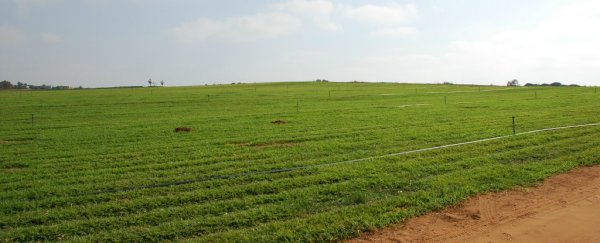Prescription drugs are very important for those who need them, and completely unnecessary for those who don't. And in a world where over-prescription is causing some pretty serious health problems, many of us try to avoid extra medications where possible.
But that might be harder than we realise, with new research suggesting that small traces of prescription drugs we don't even know about could be found in certain fruits and vegetables. Worse still, they're most likely getting there through someone else's old urine, and can eventually end up in our own.
The new study by researchers from the University of Jerusalem in Israel looked at the epilepsy drug carbamazepine, which is partly excreted in the urine when taken as it should be. That's fine, except that many crops these days are irrigated with reclaimed or recycled water - which is basically a purified version of what we flush down the toilet.
This means that carbamazepine can actually accumulate in those crops, and also inside the unsuspecting person who eats them - eventually ending up in the urine of the individual who ate the produce, and continuing the cycle.
Irrigating crops using reclaimed or recycled water is a practise that's gaining traction in Israel, Spain, Australia, and some areas of North America, and for good reason. It allows drought-stricken areas to save limited drinking water for drinking, and provides a constant water source for crop growth.
But there has been some investigation in the past into what can end up on the crops, such as pathogens and pharmaceuticals, and what this means for us as consumers.
The new study published in Environmental Science & Technology, looked at 34 healthy adults who were not currently taking carbamazepine, and investigated what happened when one half were given produce watered with reclaimed water, and the other half were given produce watered with drinking water.
Halfway through the study, the reclaimed water group switched to fruit and vegetables watered with drinking water, and the fresh water group switched to a grocery store mix of produce (this was an error on behalf of the researchers, because apparently they ran out of reclaimed water crops).
What happened to the first group though, was pretty interesting - in the first week, 100 percent of the participants had quantifiable amounts of the drug and its metabolites in their urine, when only 26 percent had quantifiable amounts before the study began.
In the second week, after group one went back to fresh water crops, their levels dropped back down to base level. Group two's levels were not affected, even though some of the grocery store produce tested positive for carbamazepine.
"We also report that the carbamazepine metabolite pattern at this low exposure level differed from that observed at therapeutic doses," the researchers explain. "This 'proof of concept' study demonstrates that human exposure to xenobiotics occurs through ingestion of reclaimed wastewater-irrigated produce, providing real world data which could guide risk assessments and policy designed to ensure the safe use of wastewater for crop irrigation."
As a proof of concept study with a small sample size, these results will need to be replicated in further trials to investigate the extent of the issue. And the amount of drugs found in their system were low - four orders of magnitude lower then seen in those taking the full dose – so the potential health effects could be negligible.
As Beth Mole discusses over at Ars Technica, this is not bad news, and we don't need to freak out over the results: "Both of those findings - that drug levels can quickly drop after exposure and the mixed supermarket food didn't alter levels - is relatively good news for public health, the authors note. Still, the unintentional drug doses in food are a concern worth more attention by the public health community."
In somewhere like California, where only 6 percent of irrigation uses recycled water, the likelihood of you ending up with second hand drugs in your system is pretty low. But as using recycled water in agriculture is becoming more popular and in areas like Israel, where up to 50 percent of irrigation is done by reclaimed water, it's important that this result is explored further.
